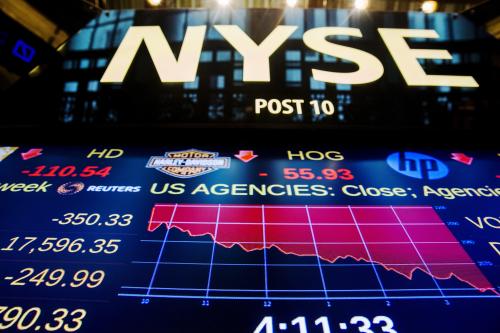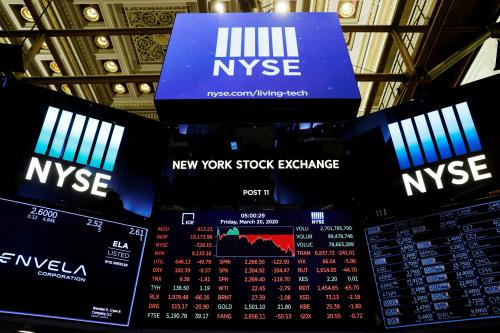This week, the Senate will conduct confirmation hearings on Jay Clayton, President Trump’s nominee to head the Securities and Exchange Commission (SEC). No doubt the news will be overshadowed by all the other big stories in Congress, especially the health care vote. But perhaps no other nomination holds as much power to reshape the American economy in ways that could deliver on President Trump’s promise to restore jobs.
Here’s why.
No one group of elites set out to destroy the American economy and shift wealth to the top one percent at the expense of the ninety-nine percent. Instead, over the past several decades, a handful of obscure but important shifts—in laws, regulations, and standard practices—have changed the incentive structure of American corporations, leading to increasingly short-term behavior on the part of corporate leadership. Once these incentives came to pervade the private sector, they had broad effects. Perverse micro-incentives have created a macroeconomic problem.
Four trends constitute the architecture of modern short-termism: the proliferation of stock buybacks, the increase in non-cash compensation, the fixation on quarterly earnings, and the rise of activist investors. Although these actions are all perfectly legal, they have reinforced short-term corporate behavior. While cash distributed to shareholders as a share of cash flow has surged to a record high during the past decade, the share devoted to capital investment has fallen to a record low. No wonder productivity and wages have grown so slowly.
To alter these trends, the Trump administration must unwind the architecture of modern short-termism. And the head of the SEC will be in a key position to do so.
For instance, the new SEC head could push to rein in the proliferation of stock buybacks. Prior to 1982, SEC rules did not provide companies buying back their own stock with a “safe harbor” protection against insider trading violations, and many companies limited their open-market buying out of fear of SEC prosecution. The rule change that allowed for the eventual surge in share repurchases began in 1982 after the SEC adopted a new rule—10b-18 of the Securities Exchange Act—that enabled corporate managers to purchase large quantities of their companies’ stock without fearing that the SEC would accuse them of stock-price manipulation. [1] This change guaranteed that companies would not be charged if their buybacks on any single day were no more than 25 percent of average daily trading volume over the previous four weeks. Nor would there be a presumption of manipulation if open-market purchases exceeded this level. William Lazonick, a professor at the University of Massachusetts who has conducted pioneering studies of this shift, recommends that this rule be dramatically curtailed or reversed outright. If ordinary Americans are not allowed to engage in insider trading based on non-public information, why should company managers be allowed to do so?
The new SEC chair should also take a look at the system for non-cash compensation. In 1993, a change in the tax code capped corporate deductibility of executive compensation at $1,000,000 unless amounts over that ceiling qualified as “performance-based,” thus adding to the momentum for on-salary compensation. [2] The results of this change in executive pay have been stunning. Fifty years ago, median CEO compensation was about $1 million (in 2011 dollars), almost all of which came in the form of salaries and bonuses. By 2011, median compensation had increased to nearly $9 million, 70 percent of which consisted of stock awards and options.
The new SEC chair could also discourage the issuance of quarterly reports which are not required by law and which have made many executives prisoner of the quarterly earnings call, causing some of them to put the short term over the longer-term investments.
Finally, the new SEC chair should take a long hard look at current accounting practices. One of the most important and long-lasting results of the Great Depression was the passage of legislation in 1933 and 1934 that created the architecture for regulating the securities market. Central to the theory of those acts is the concept that transparency is a critical component of a healthy market. The results of the legislation were disclosure requirements intended to protect the public and investors. Over the years, these requirements were standardized into generally accepted accounting standards, and supported and enforced by the Securities and Exchange Commission. But as Robert Eccles and Jean Rogers of the Sustainable Accounting Standards Board (SASB) point out, as important as the development of standard financial accounting was, “the world is now a very different place—facing megatrends such as population growth, food scarcity, climate change and resource constraints. Today, financial accounting alone cannot capture the complete picture of a company’s value.” In this day and age, a complete picture of a company’s value and future can only be taken if sustainability information material to its performance is evaluated side by side with financial information.
Changes such as the ones identified above will free funds for investments in employees as well as plant, equipment, and R&D. By contrast, the perverse incentives in the status quo contribute to rising inequality, a shrinking middle class, a widening wedge between productivity and compensation, and decreased business investment. Unless Jay Clayton’s SEC can turn this around, Donald Trump will be facing millions of disappointed voters.
[1] Richard L. Hudson, “SEC Eases Way For Repurchase Of Firms’ Stock,” The Wall Street Journal, November 10 1982.
[2] Donald Tomaskovic-Devey, Ken-Hou Lin, Nathan Meyers, “Did Financialization Reduce Economic Growth?” p.27. Available at: http://ssrn.com/abstract=2571897.; Nancy L. Rose and Catherine Wolfram, “Regulating Executive Pay: Using the Tax Code to Influence Chief Executive Officer Compensation,” Journal of Labor Economics, Vol. 20, No. 2, 2002.; Leila Emami Davis, “The financialization of the nonfinancial corporation in the post-1970 U.S. economy” (2014). Doctoral Dissertations 2014-current.
The Brookings Institution is committed to quality, independence, and impact.
We are supported by a diverse array of funders. In line with our values and policies, each Brookings publication represents the sole views of its author(s).










Commentary
Confirming Team Trump: Jay Clayton can boost the economy by reining in Wall Street at the SEC
March 22, 2017